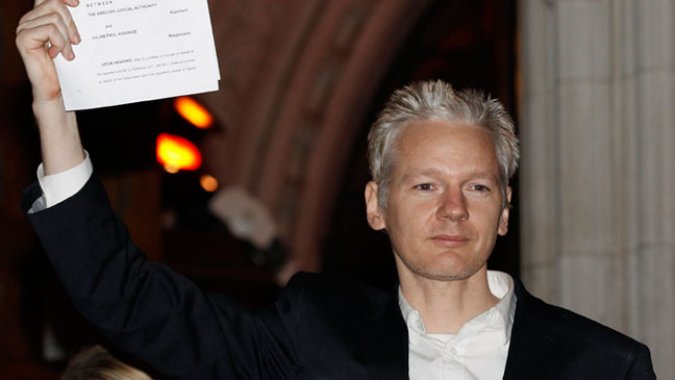- Julian Assange says the documents are "newsworthy." His
website has now put up the documents in a searchable format
so that it "remains accessible to the public for years to
come."
by Eriq Gardner
4/16/2015 10:55am PDT
On Thursday, WikiLeaks published more than 30,000
documents and 170,000 emails from Sony Pictures, obtained
from a hack that has been sourced to North Korea in
anticipation of the studio's release of The Interview.
The Julian Assange website noted in
a press release that "whilst some stories came out at
the time, the original archives, which were not searchable,
were removed before the public and journalists were able to
do more than scratch the surface."
In a move that could trigger another round of
embarrassing prying into Sony affairs, WikiLeaks has now
published those documents in a searchable format.
"This archive shows the inner workings of an influential
multinational corporation," says Assange. "It is newsworthy
and at the centre of a geo-political conflict. It belongs in
the public domain. WikiLeaks will ensure it stays there."
In what could be a preemptive move to defend the
newsworthy nature of what's been published, WikiLeaks
is stressing some of the documents with political and policy
implications. These include Sony's reactions to the
Trans-Pacific Partnership — a trade treaty that is presently
getting Congressional attention. There's also the studio's
involvement in anti-piracy causes.
Sony Pictures Entertainment condemned the release of the
documents.
“The cyber-attack on Sony Pictures was a malicious
criminal act, and we strongly condemn the indexing of stolen
employee and other private and privileged information
on WikiLeaks," Sony said in a statement. "The attackers used
the dissemination of stolen information to try to
harm SPE and its employees, and now WikiLeaks regrettably is
assisting them in that effort. We vehemently disagree
with WikiLeaks’ assertion that this material belongs in the
public domain and will continue to fight for the safety,
security, and privacy of our company and its more than
6,000 employees.”
WikiLeaks says it has documents about the connections between
Sony and the Democratic Party, from "SPE's CEO [Michael]
Lynton attending dinner with President [Barack]
Obama at Martha's Vineyard" to an alleged
effort to get around campaign donation limits to support New
York Governor Andrew Cuomo. The website also
points to Lynton's involvement on the board of trustees of RAND
Corporation, a policy think tank on the edge of the military
sector, and how Sony reached out to the State Department and the
NSA about North Korea's complaints about The Interview.
With an interest in intelligence matters that once prompted
WikiLeaks to publish state department cables, WikiLeaks
appears especially fascinated by Sony "collecting 'intelligence'
on rival pictures." It cites as an example the budget breakdown
for Oliver Stone's Snowden.
In December, as hackers slowly released Sony
Picture documents with threats to the company about releasing
The Interview, federal law enforcement reportedly made
cyber counter-measures to impede the flow of information.
WikiLeaks presents a digital operation that could be more
resilient to such digital attacks. Sony has previously made
legal warnings to those in the media publishing its trade
secrets.
"WikiLeaks has a commitment to preserving the
historical archive," states the press release. "This means
ensuring archives that have made it to the public domain remain
there regardless of legal or political pressure, and in a way
that is accessible and useable to the public. WikiLeaks'
publication of The Sony Archives will ensure this database
remains accessible to the public for years to come."
©2015 The Hollywood Reporter.
All rights reserved.
http://www.hollywoodreporter.com/news/sony-hack-wikileaks-publishes-more-789263

